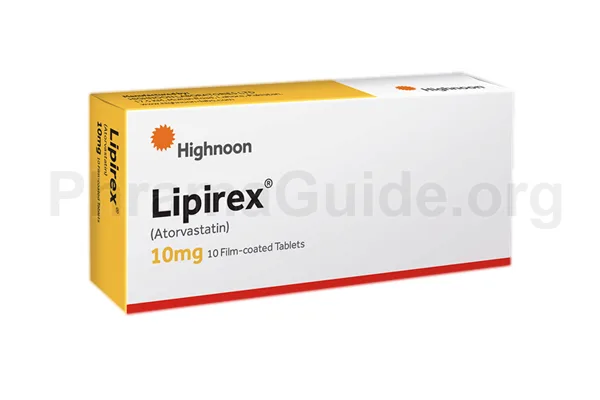Lipirex tablet is primarily used to manage and prevent cardiovascular diseases by lowering cholesterol levels in the blood. It belongs to the class of drugs called statins. Following are some common uses of Lipirex Tablet:
- Hypercholesterolemia: Lipirex tablet is used to lower elevated levels of low-density lipoprotein cholesterol (LDL-C), often referred to as “bad” cholesterol. It helps to reduce total cholesterol and LDL-C levels, thereby reducing the risk of cardiovascular events such as heart attacks and strokes.
- Dyslipidemia: Lipirex tablet is used to treat various types of dyslipidemia, including mixed dyslipidemia and familial hypercholesterolemia. It helps improve the lipid profile by lowering LDL-C and triglyceride levels and increasing high-density lipoprotein cholesterol (HDL-C) levels.
- Cardiovascular Disease Prevention: Lipirex tablet is commonly used in individuals at high risk of cardiovascular disease, such as those with a history of heart attacks, strokes, or other cardiovascular events. It helps to reduce the risk of future cardiovascular events and mortality.
- Coronary Artery Disease: Lipirex tablet is used to manage coronary artery disease by slowing down the progression of atherosclerosis (hardening and narrowing of the arteries). It helps to improve blood flow to the heart and reduces the risk of complications such as angina, heart attacks, and the need for invasive procedures like angioplasty or bypass surgery.
- Stroke Prevention: Lipirex tablets may be used in individuals who have had a stroke or transient ischemic attack (TIA) to prevent further stroke occurrences. It reduces the risk of recurrent strokes by managing underlying risk factors and improving overall cardiovascular health.
Off-label Uses of Lipirex Tablet
- Non-Alcoholic Fatty Liver Disease (NAFLD): Lipirex tablet is used as a potential treatment for NAFLD, a condition characterized by the accumulation of fat in the liver. It may help improve liver enzyme levels and reduce liver inflammation in individuals with NAFLD. Alzheimer’s Disease: Lipirex tablets may used in individuals with Alzheimer’s disease. It may have neuroprotective effects and help reduce the progression of cognitive decline.
- Rheumatoid Arthritis: Lipirex tablet can be used as an adjunct therapy in the management of rheumatoid arthritis (RA). It helps to reduce the disease activity and inflammatory markers in individuals with RA.

What is Lipirex?
Lipirex is one of the leading brands of Atorvastatin, manufactured and marketed by Highnoon Laboratories (Pvt) Ltd, Pakistan.
Lipirex Alternatives : Other Similar Brands
The following are some alternative brands of Lipirex and their manufacturers.
- Lipiget : Getz Pharmaceuticals (Pvt) Ltd, Pakistan.
- Lipitor : Pfizer Laboratories Inc.
- Lochol : Scilife Pharma (Pvt) Ltd, Pakistan.
- Stat-A : High Q International.
- Winstor : Sanofi Aventis (Pakistan) Ltd.
- Pro-Statin : Consolidated Chemical Laboratories (Pvt) Ltd, Pakistan.
- Descol : Nabiqasim Industries (Pvt) Ltd, Pakistan.
- Truva : Sami Pharmaceuticals (Pvt) Ltd, Pakistan.
- Mypro : Pharmevo (Pvt) Ltd, Pakistan.
- Atorsan : Novartis (Pakistan) Ltd.
Lipirex : Available Formulations and Strengths
Presently, Lipirex is available in Tablets form with the following strengths.
Lipirex Tablets : 10mg, 20mg, and 40mg strengths.
Who Should Not Use Lipirex?
Despite the potential benefits of Lipirex uses discussed above, there are several contraindications that must be taken into consideration before beginning a course of treatment.
Hypersensitivity: Lipirex is contraindicated in individuals who have a known hypersensitivity or allergic reaction to Lipirex or any of its components. Signs of hypersensitivity may include rash, itching, swelling, or difficulty breathing. If you have a known hypersensitivity, an alternative medication should be considered.
Active Liver Disease: Lipirex is contraindicated in individuals with active liver disease or unexplained persistent elevations of liver enzymes. The use of Lipirex can further exacerbate liver dysfunction or increase the risk of liver-related adverse effects.
Pregnancy and Breastfeeding: Lipirex is contraindicated in pregnant women or women who are breastfeeding. The medication can potentially harm the developing fetus or pass into breast milk and harm the nursing infant. If you are pregnant, planning to become pregnant, or breastfeeding, alternative treatments should be discussed with your healthcare professional.
Concomitant Use with Certain Medications: Lipirex may have interactions with other medications, and in some cases, coadministration is contraindicated. For example, the use of Lipirex is contraindicated with strong inhibitors of the enzyme cytochrome P450 3A4 (CYP3A4), such as certain antifungal medications (e.g., itraconazole, ketoconazole) and HIV protease inhibitors (e.g., ritonavir). These medications can significantly increase the levels of Lipirex in the body, leading to an increased risk of adverse effects.
Active Muscle Disorders: Lipirex is contraindicated in individuals with active muscle disorders or a history of muscle-related adverse effects from statin therapy, such as myopathy or rhabdomyolysis. The use of Lipirex can further increase the risk of muscle-related complications.
What is the Recommended Daily Dosage of Lipirex?
Lipirex Dose for Hypercholesterolemia and Mixed Dyslipidemia:
- Starting dose: 10-20 mg once daily.
- Maintenance dose: 10-80 mg once daily.
Lipirex Dose for Homozygous Familial Hypercholesterolemia:
- Starting dose: 10-20 mg once daily.
- Maintenance dose: 10-80 mg once daily.
Lipirex Dose for Prevention of Cardiovascular Events:
- Starting dose: 10-20 mg once daily.
- Maintenance dose: 10-80 mg once daily.
How Lipirex Works?
Lipirex works by inhibiting an enzyme called HMG-CoA reductase, which is responsible for the production of cholesterol in the liver. By inhibiting this enzyme, Lipirex reduces the synthesis of cholesterol, leading to a decrease in the levels of LDL cholesterol (often referred to as “bad” cholesterol) in the bloodstream.

Leave A Comment